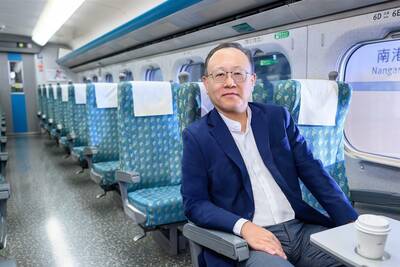The first of two televised debates today between the two presidential candidates will be simultaneously translated in the Hakka language.
Channel 17 will provide simultaneous translation of the two-hour debate between President Chen Shui-bian (陳水扁) and Chinese Nationalist Party (KMT) Chairman Lien Chan (連戰) this afternoon between 2pm and 4pm for Hakka-speaking viewers, who account for about 20 percent of the nation's 23 million people.
Yeh Chu-lan (葉菊蘭), chairman of the Council for Hakka Affairs, said that prior to the establishment in July last year of the Hakka TV channel, Hakka people who could not speak Mandarin were shut out of the world of TV.
Yeh said that because of past campaigns promoting Mandarin, the Hakka language was fast disappearing.
Among Hakka between the ages of 13 and 29, only 36.3 percent can still speak the language fluently, while the figure drops to only 11.7 percent for those under 13.
At the same time, however, there were many elderly Hakka who were unable to understand Mandarin, Yeh said.
This situation had seen some improvement after the council began to promote Hakka-related events, including the launch of the Hakka TV channel, she said.
Council officials said the launch of the channel had enabled younger Hakka to learn more about their language and culture, while older members of the community could now enjoy TV in their own tongue.
The channel had also enhanced understanding among non-Hakka people of the beauty of Hakka culture and provided an opportunity to learn the language, the officials said.
The first simultaneous Hakka broadcast of a debate between presidential candidates will also allow elderly Hakka voters who do not speak Mandarin to participate in this important moment in the nation's democratic history, they added.
VOICE OF THE PEOPLE
In related news, the convener of an alliance representing underprivileged people and other welfare groups yesterday urged the two candidates not to avoid answering questions during the debate.
"Pan-purple alliance" member Chien Hsi-chieh said that alliance spokesman Wang Jung-chang (王榮璋) would be one of the five representatives asking questions during the debate.
He said Wang would act as the voice of the people and reflect their views.
Observers have welcomed the debate between the two presidential candidates, saying that the public is tired of the negative campaigning and mudslinging that has taken place so far. They said the series of debates will serve to assist undecided voters with making their choice in the March 20 election.
Chien said that although Wang was only allowed to ask two questions, the questions would gauge whether the candidates had really responded to the needs of the people.
Chien was also satisfied about the five representatives who had been selected to ask questions.
They include a researcher from the Academia Sinica, the nation's top research institute, an official from a private judicial reform group, a university professor and an official from the Ministry of Education.
The five were neutral observers, and favored neither the president nor his challenger, Chien said.

The inspection equipment and data transmission system for new robotic dogs that Taipei is planning to use for sidewalk patrols were developed by a Taiwanese company, the city’s New Construction Office said today, dismissing concerns that the China-made robots could pose a security risk. The city is bringing in smart robotic dogs to help with sidewalk inspections, Taipei Deputy Mayor Lee Ssu-chuan (李四川) said on Facebook. Equipped with a panoramic surveillance system, the robots would be able to automatically flag problems and easily navigate narrow sidewalks, making inspections faster and more accurate, Lee said. By collecting more accurate data, they would help Taipei

STATS: Taiwan’s average life expectancy of 80.77 years was lower than that of Japan, Singapore and South Korea, but higher than in China, Malaysia and Indonesia Taiwan’s average life expectancy last year increased to 80.77 years, but was still not back to its pre-COVID-19 pandemic peak of 81.32 years in 2020, the Ministry of the Interior said yesterday. The average life expectancy last year increased the 0.54 years from 2023, the ministry said in a statement. For men and women, the average life expectancy last year was 77.42 years and 84.30 years respectively, up 0.48 years and 0.56 years from the previous year. Taiwan’s average life expectancy peaked at 81.32 years in 2020, as the nation was relatively unaffected by the pandemic that year. The metric

TAKING STOCK: The USMC is rebuilding a once-abandoned airfield in Palau to support large-scale ground operations as China’s missile range grows, Naval News reported The US Marine Corps (USMC) is considering new sites for stockpiling equipment in the West Pacific to harden military supply chains and enhance mobility across the Indo-Pacific region, US-based Naval News reported on Saturday. The proposed sites in Palau — one of Taiwan’s diplomatic allies — and Australia would enable a “rapid standup of stored equipment within a year” of the program’s approval, the report said, citing documents published by the USMC last month. In Palau, the service is rebuilding a formerly abandoned World War II-era airfield and establishing ancillary structures to support large-scale ground operations “as China’s missile range and magazine

Passengers on Taiwan High Speed Rail (THSR) will be required to use headphones and make phone calls in gangways under new “quiet travel” rules starting Sept. 22. THSR Chairman Shih Che (史哲) told media that THSR will run a three-month promotional campaign to ensure widespread adoption of the new rules. Those repeatedly ignoring the guidance face the potential termination of their transport contract, which can result in them getting escorted off the train, according to THSR. Shih shared his hope to cultivate an environment conducive to rest and reading for the train’s passengers, stating that these changes aim to “promote self-discipline” among passengers